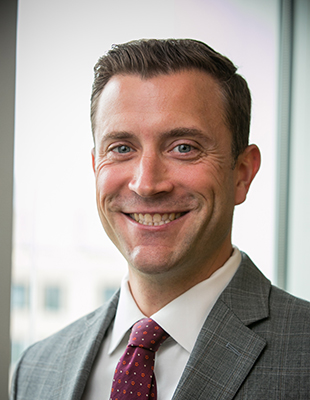On the Right Track
Heinz College alumnus is taking the lead at the top railroad policy and research organization
By Amanda Hartle
President and CEO of the Association of American Railroads Ian Jefferies (HNZ 2005) credits his time at Carnegie Mellon University for putting him on the right track for success on Capitol Hill.
After several key political roles, Jefferies was selected to lead one of the world’s top railroad policy and research organizations in January 2019, where he could advance the organization into the future.
“We’re proud of our legacy, but we’re excited about our future. We’re really trying to shift the way people think about the rail industry,” Jefferies says.
His career route included high-profile stops in the mayor’s office in Lexington, Kentucky, and the U.S. Government Accountability Office, Department of Transportation and Senate in Washington, D.C.
“The policy analysis rigor that is drilled into your head at CMU has served me well in prior positions in Washington, D.C.,” says Jefferies. “It sticks with me even at this higher executive level, and it continues to serve me to this day.”
Jefferies tested the financial services industry and experienced the ’90s tech bubble burst before combining his interests in public service and volunteerism into an altruistic new direction. After a stint as a senior advisor to the mayor in Kentucky’s second-largest city, he found the master’s program in public policy and management at Heinz College’s School of Information Systems, Public Policy and Management.
During one of his final projects, The System Synthesis Project with Professor Joel A. Tarr, his team worked together to develop solutions for Pittsburgh’s water and wastewater issues that stem from a plethora of neighboring government entities with the same goals but differing geographic regions, budgets and processes.
He reflects that it was good practice for a future of building consensus for positive purposes.
“We developed an intergovernmental management model commission,” says Jefferies. “The team, the approach we developed and the final product was a good way to set up the program evaluation work I did right when I arrived in D.C.”
When he moved to the Transportation Department and the Senate’s Commerce, Science and Transportation Committee as a lead staffer, he immersed himself in transportation issues covering an array of transportation modes including freight and passenger rail.
New technology innovations such as drones with high-resolution cameras, evolved detectors and advanced sensors will raise rail safety even higher, while other advancements will decrease the industry’s carbon footprint.
This new role gives him the opportunity to continue improving the railroad industry and change mindsets about railroads for the public and policy makers.
“We’ve been around for 150 years, and we’re going to be around for another 150 years. But we’re going to be doing things in new, innovative and technologically forward-looking ways,” he explains. “Today’s railroad can transport one ton of freight 470 miles on one gallon of fuel. When you’re talking about fuel efficiency, that number illustrates the environmental and sustainable operations of railroads.”
Looking to the future in an evolving world, Jefferies knows he is well-prepared for any challenges.
“The time I spent at CMU really focusing on developing those program evaluation skills and developing those policy analysis skills has allowed me to expand and look at things with a global perspective.”
